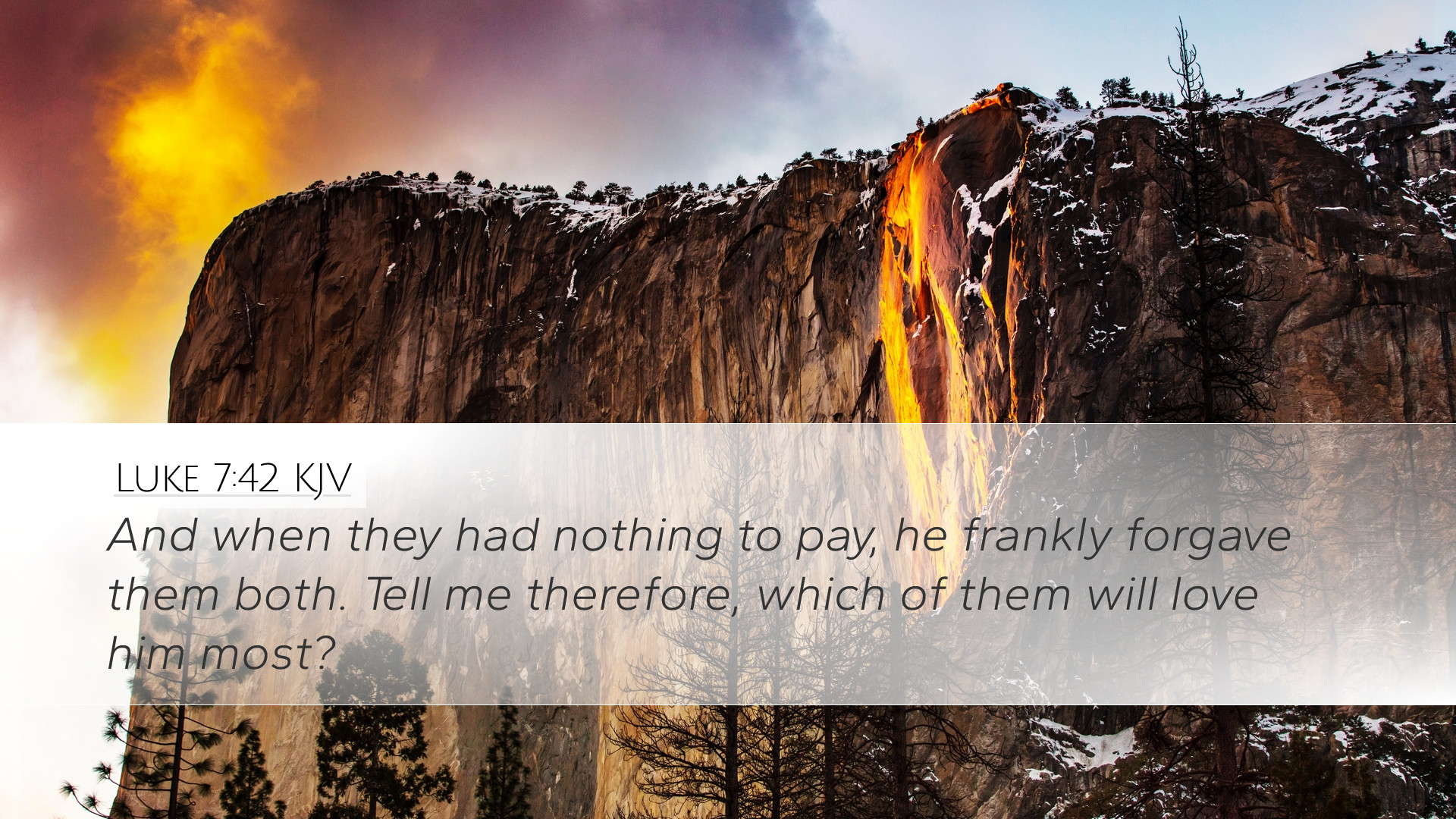Commentary on Luke 7:42
Verse Text: "And when they had nothing to pay, he frankly forgave them both. Tell me therefore, which of them will love him most?"
Introduction
In this passage, Jesus teaches profound lessons on forgiveness and love through the parable of the two debtors. The context is essential, as it follows a significant moment in the ministry of Jesus, where His authority was being questioned by the Pharisees and others. Here, Jesus provides a deep insight into the nature of love and gratitude in relation to forgiveness.
Contextual Analysis
This verse is located within the broader narrative of Luke 7, which depicts Jesus' interactions with sinners, His authority over sin, and His gracious disposition towards those who repent. It is crucial to understand the socio-religious implications of His teaching, especially in relation to the spiritual leaders of the time.
Insights from Public Domain Commentaries
Matthew Henry's Commentary
According to Henry, the debtors in the parable symbolize two classes of sinners—those who recognize the weight of their sin and those who are oblivious to it. He emphasizes that the act of forgiving the debts symbolizes God's grace. Henry also points out that the greater the debt forgiven, the greater the love that ensues. He notes, "He who is forgiven much, loves much."
Albert Barnes' Notes
Barnes amplifies the relationship between forgiveness and love. He states that the acknowledgment of one's debt is crucial in understanding the essence of love. The debtor who owes a larger sum recognizes the enormity of his guilt and, therefore, has a profound sense of gratitude. Barnes emphasizes that this realization leads to a greater degree of love towards the one who forgives. He illustrates that this principle is not merely about monetary value but reflects spiritual debt, where all are indebted to God.
Adam Clarke's Commentary
Clarke explores the implications of love arising from forgiveness. He highlights the importance of the acknowledgment of sin in relation to the divine mercy granted through Christ. Clarke elaborates on the social context, observing how the Pharisee's lack of understanding puts him at a spiritual disadvantage. Clarke writes, "Those who are conscious of their sin are the most open to the love of Christ." This perspective underscores the transformative power of recognizing one's need for grace.
Theological Implications
This verse articulates key theological themes, such as:
- Forgiveness: The nature of God's forgiveness is presented as freely given, regardless of the debt's size.
- Love and Gratitude: There is a direct correlation between one's understanding of forgiveness and the resultant love felt towards God.
- Repentance: Acknowledgment of sin and the resulting transformation that occurs through receiving grace is essential.
Practical Applications
For pastors and teachers, this verse serves as a foundation for discussing the relationship between forgiveness and love within the church community. Practical applications include:
- Encouraging Confession: Create an environment where congregants feel safe to admit their sins and experiences of grace.
- Promoting Forgiveness: Teach the necessity of forgiving others as a response to being forgiven.
- Building Love in Community: Foster love that flows from an understanding of God's profound grace and mercy.
Conclusion
Luke 7:42 encapsulates the heart of the Gospel: forgiveness leads to love. Jesus' parable invites all to reflect on their own spiritual state and the depth of their gratitude towards God for His forgiveness. This powerful message continues to resonate deeply within the hearts of believers, urging them towards a lifestyle characterized by profound love and compassion.


